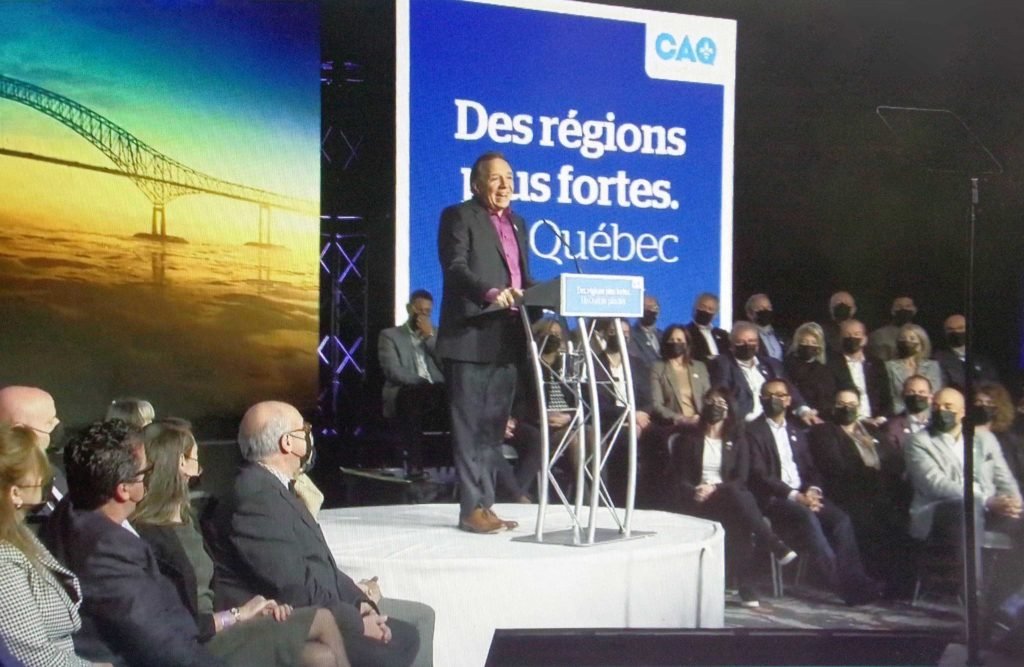Incumbent Premier addresses CAQ faithful, while courting Quebec’s rural regions
Quebec Premier François Legault all but confirmed at the conclusion of the Coalition Avenir Québec’s general council meeting in Trois Rivières last Sunday what most observers had assumed already without knowing for certain.
Legault was hinting around two years into his first mandate which started in October 2018 that he felt the work he’d started a decade ago when he founded the CAQ was done and that he might be stepping away to make room for another leader.
‘Ready for another four years’
However, finishing his speech to the CAQ membership just before the end of the two-day Covid-restricted gathering held as a warmup for the provincial election next year, Legault said, “I finish by saying that I need you the activists.

“Together, we have already made a lot of changes, but have still many changes to make. And so, I think, I have the impression that we are going to need another mandate. It wouldn’t be great, it seems to me in any case, to break the momentum. As far as I’m concerned, I’m ready to go for another four years. Do you feel like getting on board with me?”
If the CAQ’s gathering was an indicator of what the party has in store leading towards the October 2022 election, Quebecers can expect the party will be repeating the strategy that got them elected in 2018 – an intense focus on the province’s rural regions where their electoral support is strong, with less attention paid to the major urban centres where they have thinner support.
Little focus on Montreal region
Throughout Legault’s closing speech summing up the party’s accomplishments while offering a glimpse of the future, scant reference was made to Quebec’s largest urban centres – including the greater Montreal region. And even then, it was only while referring to the “inter-dependence” of the urban centres with the regions in helping to develop and build up the overall economy of Quebec.
Whether the Premier was consciously trying to emulate the late Canadian Prime Minister Sir Wilfrid Laurier who famously said, “Let me tell you, my fellow countrymen, that all the signs point this way, that the 20th century shall be the century of Canada and Canadian development,” Legault confidently proclaimed:
“The 21st century will be the century of the green economy, and the 21st century will be the century of Quebec.” Similarly, and invoking the regional theme again, Legault said later, “My dream, as I was saying earlier, is that the 21st century becomes the century of the regions of Quebec.”
Legault’s economic nationalism
The word “nationalism” loomed at some points during Legault’s speech, although mostly in an economic rather than cultural or political context. The Premier said he was proud of how Quebecers went all out to purchase Quebec-made products so as to encourage the local economy during the pandemic.
‘the 21st century will be the century of Quebec’
“We’re going to continue – the idea is to replace other products, including products made in China with products made in Quebec,” he said, pronouncing the part about China in English.
“Sure, we won’t be able to replace all the products. But there are some where we are able to be competitive.” Regarding the province’s agricultural output, Legault observed, “When you look at what we eat, there’s just 50 per cent that comes from Quebec.”
Hi-speed Internet for regions
A significant part of the focus over the weekend (dealing again with the province’s regions) was a CAQ government plan to make high-speed Internet service available in all isolated and far-flung sectors of Quebec before the government’s mandate ends late next year.
On the issue of employment, Legault again invoked the regions, noting that there are regions of Quebec where unemployment persists in spite of a shortage of workers reported by business owners. “The best way to enrich Quebec is to enrich all the regions,” he said, while also emphasizing that job re-orientation and retraining will be made available in the regions.
Perhaps more ominously in terms of what a second CAQ mandate could mean, the Premier suggested that the province’s universal health care system could undergo a major “decentralization” comparable to the one that saw Francophone school boards abolished and converted into educational service centres during the CAQ government’s first term.














